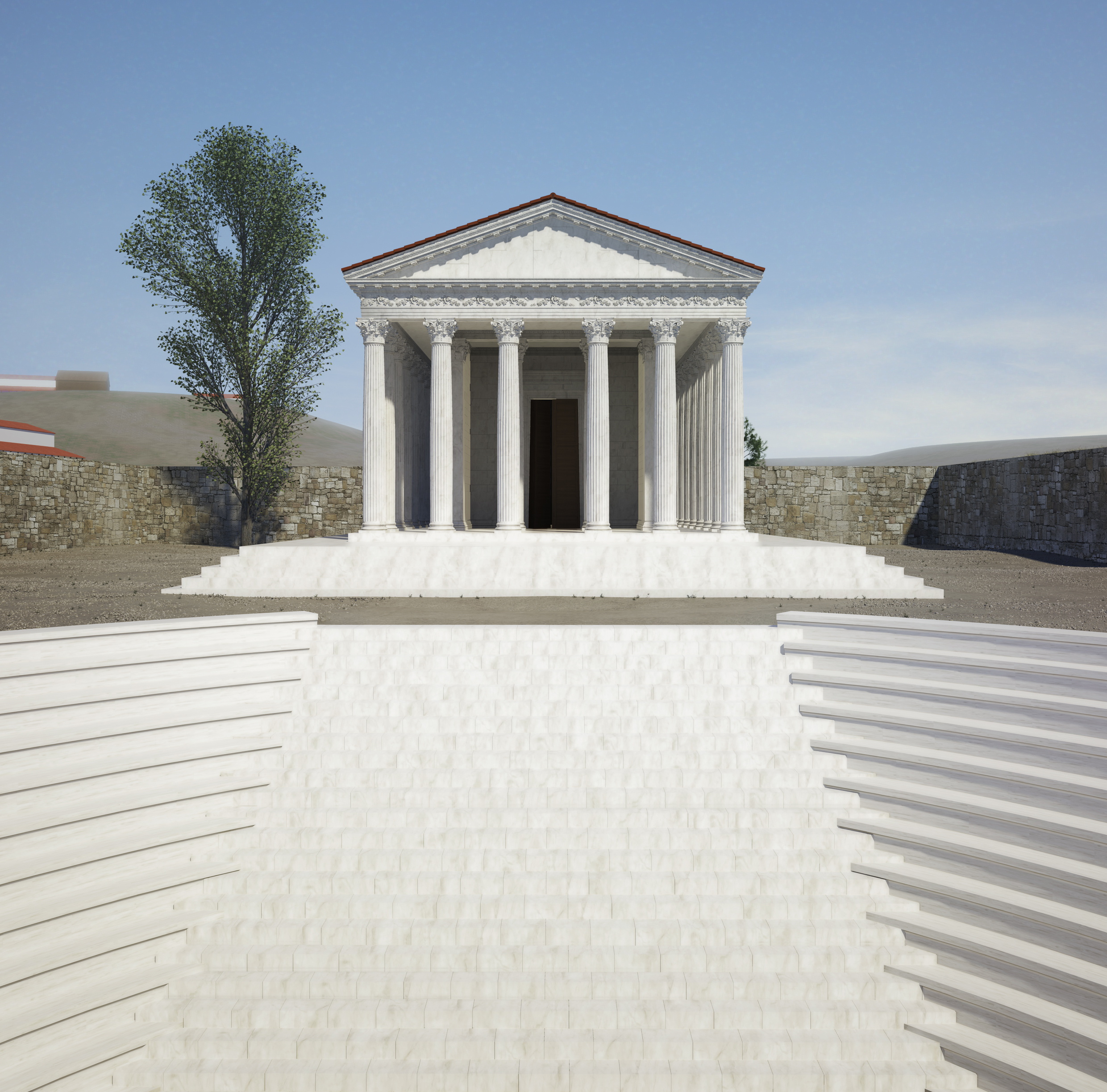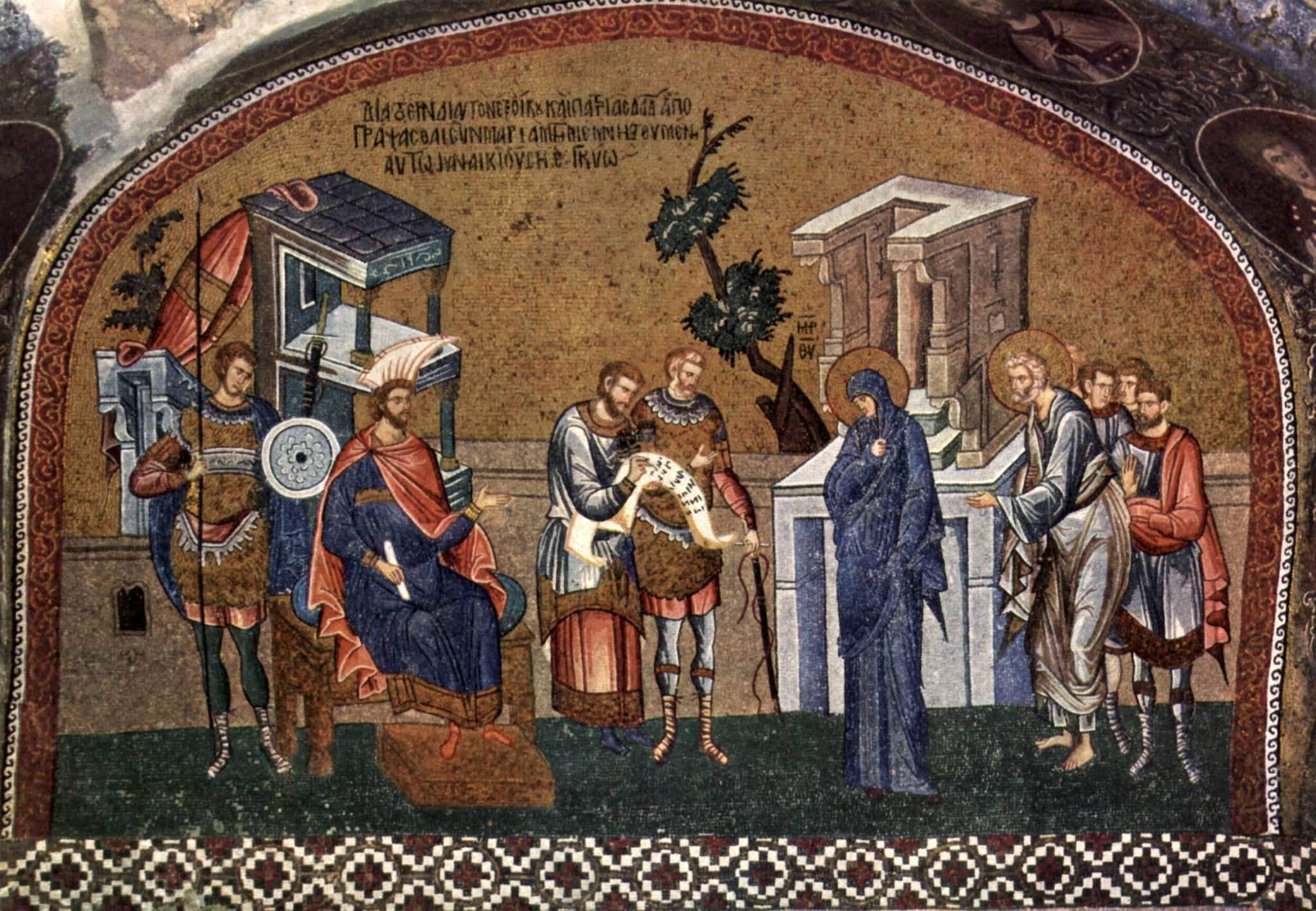|
Galatia (Roman Province)
Galatia () was the name of a province of the Roman Empire in Anatolia (modern central Turkey). It was established by the first emperor, Augustus (sole rule 30 BC – 14 AD), in 25 BC, covering most of formerly independent Celtic Galatia, with its capital at Ancyra. Under the Tetrarchy reforms of Diocletian, its northern and southern parts were split to form the southern part of the province of Paphlagonia and the province of Lycaonia, respectively. In c. 398 AD, during the reign of Arcadius, it was divided into the provinces of Galatia Prima and Galatia Secunda or Salutaris. Galatia Prima covered the northeastern part of the old province, retaining Ancyra as its capital and was headed by a ''consularis''. Salutaris comprised the southwestern half of the old province and was headed by a ''praeses'', with its seat at Pessinus. Both provinces were part of the Diocese of Pontus. The provinces were briefly reunited in 536–548 under Justinian I. Although the area was eventually inco ... [...More Info...] [...Related Items...] OR: [Wikipedia] [Google] [Baidu] |
Roman Province
The Roman provinces (Latin: ''provincia'', pl. ''provinciae'') were the administrative regions of Ancient Rome outside Roman Italy that were controlled by the Romans under the Roman Republic and later the Roman Empire. Each province was ruled by a Roman appointed as governor. For centuries it was the largest administrative unit of the foreign possessions of ancient Rome. With the administrative reform initiated by Diocletian, it became a third level administrative subdivision of the Roman Empire, or rather a subdivision of the imperial dioceses (in turn subdivisions of the imperial prefectures). Terminology The English word ''province'' comes from the Latin word ''provincia''. In early Republican times, the term was used as a common designation for any task or set of responsibilities assigned by the Roman Senate to an individual who held ''imperium'' (right of command), which was often a military command within a specified theatre of operations. In time, the term became t ... [...More Info...] [...Related Items...] OR: [Wikipedia] [Google] [Baidu] |
Pessinus
Pessinus ( el, Πεσσινούς or Πισσινούς) was an Ancient city and archbishopric in Asia Minor, a geographical area roughly covering modern Anatolia (Asian Turkey). The site of the city is now the modern Turkish village of Ballıhisar, in a tributary valley of the Sakarya River on the high Anatolian plateau at 950 m above sea level, 13 km from the small town of Sivrihisar. Pessinus remains a Catholic (formerly double) titular see. Description The temple area As yet, the temple area, which was excavated between 1967 and 1972, is the only well-studied area of Pessinus. It was studied thoroughly by M. Waelkens (current director of Sagalassos excavations) in the 1980s and between 2006 and 2012 by Verlinde (Ghent University), who built on the findings of the former to analyze and reconstruct the architecture of the Corinthian peripteral temple, of which only the massive foundations remain. Investigations led to several observations, such as the Tiberian da ... [...More Info...] [...Related Items...] OR: [Wikipedia] [Google] [Baidu] |
Marcus Annius Afrinus
Marcus Annius Afrinus was a Roman Empire, Roman Roman senate, senator, who held a number of offices in the emperor's service. He was Roman consul, suffect consul in July-August 66 with Gaius Paccius Africanus as his colleague. He is known primarily from inscriptions. Bernard Remy states that nothing is known of his origins, but notes C. Castillo suggests Afrinus may have come from Hispania Baetica.Rémy, Les carrières sénatoriales dans les provinces romaines d'Anatolie au Haut-Empire (31 av. J.-C. - 284 ap. J.-C.)' (Istanbul: Institut Français d'Études Anatoliennes-Georges Dumézil, 1989), p. 142 The ''cursus honorum'' of Afrinus is imperfectly known. His first attested office was governor of the imperial province of Galatia from around the year 49 to 54; he is surmised to have been a popular governor, for his name and portrait appear on the coinage of Claudiconium. For reasons unknown, his advancement to the consulate was much delayed; according to the ''Lex annales'', for non- ... [...More Info...] [...Related Items...] OR: [Wikipedia] [Google] [Baidu] |
Titus Helvius Basila
Titus Caesar Vespasianus ( ; 30 December 39 – 13 September 81 AD) was Roman emperor from 79 to 81. A member of the Flavian dynasty, Titus succeeded his father Vespasian upon his death. Before becoming emperor, Titus gained renown as a military commander, serving under his father in Judea during the First Jewish–Roman War. The campaign came to a brief halt with the death of emperor Nero in 68, launching Vespasian's bid for the imperial power during the Year of the Four Emperors. When Vespasian was declared Emperor on 1 July 69, Titus was left in charge of ending the Jewish rebellion. In 70, he besieged and captured Jerusalem, and destroyed the city and the Second Temple. For this achievement Titus was awarded a triumph; the Arch of Titus commemorates his victory to this day. During his father's rule, Titus gained notoriety in Rome serving as prefect of the Praetorian Guard, and for carrying on a controversial relationship with the Jewish queen Berenice. Despite concerns o ... [...More Info...] [...Related Items...] OR: [Wikipedia] [Google] [Baidu] |
Sextus Sotidius Strabo Libuscidianus
Sextus is an ancient Roman ''praenomen'' or "first name". Its standard abbreviation is Sex., and the feminine form would be Sexta. It is one of the numeral ''praenomina'', like Quintus ("fifth") and Decimus ("tenth"), and means "sixth". Although it is sometimes thought that these names originally referred to birth order and were then handed down through the family line, they may have also been a reference to the month of birth. Similar names were used among the Sabellians. The ''gens'' name Sextius is a related form.E.T. Salmon, ''Samnium and the Samnites'' (Cambridge University Press, 1967, 2010), pp. 53, 156. Among those named Sextus are: * Sextus Julius Africanus * Sextus Appuleius * Sextus Afranius Burrus * Sextus Julius Caesar * Sextus Aelius Paetus Catus * Sextus of Chaeronea (nephew of Plutarch, he and Sextus Empiricus may be one and the same) * Sextus Empiricus (he and Sextus of Chaeronea may be one and the same) * Sextus Julius Frontinus * Sextus Martinianus * Sextus Tig ... [...More Info...] [...Related Items...] OR: [Wikipedia] [Google] [Baidu] |
Marcus Plautius Silvanus (consul 2 BC)
Marcus Plautius Silvanus was a Roman politician and general active during the Principate. He was consul in 2 BC as the colleague of the emperor Augustus. Biography Marcus Plautius Silvanus the son of another Marcus Plautius Silvanus and Urgulania,Lily Ross Taylor"Trebula Suffenas and the Plautii Silvani" ''Memoirs of the American Academy in Rome'', 24 (1956), p. 24 a close friend of the empress Livia who was of Etruscan descent. It is suggested by Ronald Syme, extrapolating from Tacitus, that it was Urgulania's influence over Livia that allowed Silvanus to climb the cursus honorum, enabling him to reach the consulate in 2 BC alongside Augustus. Silvanus was then made proconsul of Asia in 4-5 AD, followed by appointment as ''legatus pro praetore'' of the imperial province of Galatia in 6 AD, where he was involved in suppressing the Isaurians as mentioned in Cassius Dio.Cassius Dio, ''The Roman History'', LV, 28 He was also a septemvir of the Epulones. Although Silvanus serv ... [...More Info...] [...Related Items...] OR: [Wikipedia] [Google] [Baidu] |
Marcus Servilius Nonianus
Marcus Servilius Nonianus (died in 59AD) was a Roman senator, best known as a historian. He was ordinary consul in 35 as the colleague of Gaius Cestius Gallus. Tacitus described Servilius Nonianus as a man of great eloquence and good-nature.Tacitus, ''Annales'', XIV.19 He wrote a history of Rome which is considered the major contribution on the topic between the works of Livy and Tacitus, and which was much referred to by later historians, but was later lost.Ronald Syme, "Servilius Nonianus", ''Hermes'', 92. Bd (1964), pp. 408, 421ff A number of anecdotes regarding him survive and help to give an understanding of Roman life in the first century. Life Nonianus was descended from Gaius Servilius Geminus the praetor, who had renounced his Patrician status.Syme, "Servilius Nonianus", p. 409 His father was Marcus Servilius, consul in AD 3 and his mother the daughter of the Nonius whom Mark Antony proscribed over the possession of a gem. He was proconsular governor of Africa in 4 ... [...More Info...] [...Related Items...] OR: [Wikipedia] [Google] [Baidu] |
Publius Sulpicius Quirinius
Publius Sulpicius Quirinius (c. 51 BC – AD 21), also translated as Cyrenius, was a Roman aristocrat. After the banishment of the ethnarch Herod Archelaus from the tetrarchy of Judea in AD 6, Quirinius was appointed legate governor of Syria, to which the province of Judaea had been added for the purpose of a census. Life Born into an undistinguished family, son of Publius Sulpicius Quirinus and paternal grandson of Publius Sulpicius Quirinius, from Gens Sulpicia, in the neighbourhood of Lanuvium, a Latin town near Rome, Quirinius followed the normal pathway of service for an ambitious young man of his social class. According to the Roman historian Florus, Quirinius defeated the Marmaridae, a tribe of desert raiders from Cyrenaica, possibly while governor of Crete and Cyrene around 14 BC, but nonetheless declined the honorific name "Marmaricus". In 12 BC he was named consul, a sign that he enjoyed the favour of Augustus. From 12 to 1 BC, he led a campaign against the Homan ... [...More Info...] [...Related Items...] OR: [Wikipedia] [Google] [Baidu] |
Cornutus Aquila
{{disambiguation ...
Cornutus ( grc, Κορνοῦτος) may refer to: * Lucius Annaeus Cornutus (''fl.'' c. 60 AD), a Stoic philosopher of ancient Rome * Cornutus (plural: cornuti), a part of the aedeagus of the male Lepidoptera genitalia (butterflies and moths) See also * List of Roman cognomina __NOTOC__ This is a list of Roman cognomina. A Abercius, Abito, Abundantius, Abundius, Abundus, Aburianus, Acacius, Acaunus, Acceptus, Achaicus, Acidinus, Acilianus, Aculeo, Acutianus, Acutus, Adauctus, Adelphius, Adiut ... [...More Info...] [...Related Items...] OR: [Wikipedia] [Google] [Baidu] |
Lucius Calpurnius Piso Pontifex
Lucius Calpurnius Piso Caesoninus (48 BC – AD 32) was a prominent Roman senator of the early Empire. His tenure as pontifex led him sometimes to be called Lucius Calpurnius Piso Pontifex, to differentiate him from his contemporary, Lucius Calpurnius Piso the Augur, consul in 1 BC. He was a confidant of the emperors Augustus and Tiberius. Biography He was the son of Lucius Calpurnius Piso Caesoninus, consul in 58 BC, and half-brother of Calpurnia, the third and last wife of Julius Caesar. Piso was consul in 15 BC, and shortly thereafter engaged in Mediolanum as proconsul. Cassius Dio refers to him as governor of Pamphylia in the years 13 to 11 BC; his province probably included Galatia. In 11 BC, he was sent to Thrace as legatus ''pro praetore'' in order to put down a revolt. For his successes there, the senate honoured him with the ornamenta triumphalia. Piso may have also been proconsul of Asia and legate of Syria, but this is disputed. He was ''praefectus urbi'' from AD ... [...More Info...] [...Related Items...] OR: [Wikipedia] [Google] [Baidu] |
Marcus Lollius
Marcus LolliusHazel, ''Who's Who in the Roman World'', p.171 perhaps with the cognomen PaulinusMarcus Lollius no. 5 article at ancient library (c. 55 BC-after 2 BC) was a politician, military officer and supporter of the first Roman emperor . Family background Lollius was a member of the[...More Info...] [...Related Items...] OR: [Wikipedia] [Google] [Baidu] |




